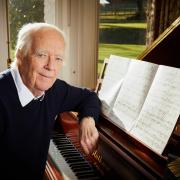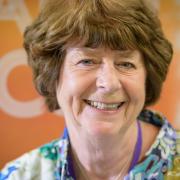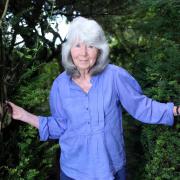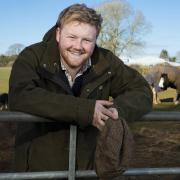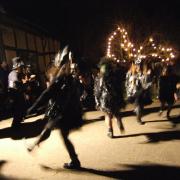Dinah Jefferies talks to Katie Jarvis about her life of two parts and how that experience influenced and inspired her first novel. Pictures by Antony Thompson

The Separation by Dinah Jefferies:


“Lydia in Malaya: The edges of the jungle were scented with wild ginger, cinnamon, and figs. High above, in tall trees that blotted out the sun, hornbills cried. Beautiful in a way, but, still, the whirring clicking life of the jungle’s creatures unsettled her.
Emma in Worcestershire: I woke up to a frozen jungle, the windowpanes iced with giant white lotus blossoms. Cold seeped round the frames and under the door… In the only room with a fire, I asked Granny where the servants’ quarters were. She clapped her hands together, wiped her eyes with her pinny, and dug Granddad in the chest.”
Close your eyes for a second and imagine. Imagine what it’s like to be separated. This isn’t an easy imagining, I know; but start by colouring the blankness of your mind with the comfort and warmth of things you cherish: a house beautified with familiar objects; the orange warmth of the noon-day sun beating down on terracotta roof-tiles; flowers – whether delicate yellow cowslips bending in an English breeze or hopelessly exotic red hibiscus stretching towards a blazing sky. Then, add the dancing smile of an open-armed child.
Now comes the anguish. Because, next, you must imagine yourself torn away from those things. One minute they’re there, as if eternity is etched into their atoms; the next – inexplicably – they’ve vanished as if they never were. Perhaps you already know that feeling: the hopelessness; the yearning; the blackness of that unfillable void. The only comfort is the knowledge that time will file off sharp edges. Even that comfort is a heart-wrenchingly different kind of loss.
I can tell you about Dinah Jefferies’s first novel. Set in 1955, it’s the story of 11-year-old Emma Cartwright, snatched by her taciturn father from the warmth of Malaya, the country she adores, inexplicably leaving her mother behind. And it’s also the story of that mother, Lydia, desperately searching for her stolen family.
But if you really want to know what it’s about, then imagine that separation.
Dinah Jefferies is talking when she should be packing. We’re in her Cheltenham home, small dog Teddy bouncing round – “He’s three years old but behaves as if he’s three weeks!” – chatting about her soon-to-be-published first novel, The Separation.
George Elliot’s first book, Adam Bede, was published as she turned 50; Laura Ingalls Wilder, of Little House on the Prairie-fame, debuted at 64. At 65, Dinah Jefferies beats them both – and there’s more to come.
“My second book is The Tea Planter’s Wife, set in Ceylon between 1925 and 1934, and Penguin have already bought it. Which is fantastic! They say they want a book a year… Oh my god!” she laughs, half-horrified, mostly thrilled.
In a couple of days, she and her husband, Richard, are off to Vietnam to research her third novel; and then it’s Norway for a book tour: balmy blue skies and sunshine, followed by a barely ice-thawing 4 degrees. A packing nightmare.
Dinah is having a ball – the travel, the excitement, the acclamation: Penguin are even comparing her to Victoria Hislop and Kate Morton.
“I’m a very happy person,” she agrees. “I love my life. I love my grandchildren - I look after them regularly - and I feel very blessed to have got a book published at my age.”
But anybody who reads The Separation will understand one thing: this is a deeply emotional book that could only have been written by someone who has visited the depths of despair and come through the other side.
Let’s begin at the beginning. Malaya – as it was then – was an obvious setting for Dinah’s first book: she was born there in 1948 and spent the first nearly-nine years of her life in this violent country: 1950s Malaya was a dangerous place. The Japanese had newly departed, leaving chaos and a looming unrest; the British were learning they couldn’t have their old territory back for the asking: independence was an inevitability. But the Malayans themselves were fighting over their future, jungles twitching with outlawed communists: here was brutal guerrilla war.
Yes, Dinah paints a country oppressive with heat, disease and cruelty. And yet – if you’re anything like me – you still end up falling in love with this strange, violent place. And the love you feel, quite clearly, is Dinah’s.
“That’s interesting,” she muses. “I was a child in Malaya so I was barely aware of what was going on. I was used to guns on the hall table when the rubber planters came in for a party; I was used to my father going out with two armed policemen every day: I thought everybody’s father did. It was normal life.”
She pauses.
“I saw some awful things – some waxworks of what happened during the Japanese occupation, one example of which is in the book: women and children tied to the ground and a steamroller coming to flatten them. It had a fantastically strong impact on me.”
Her parents, Ted and Dorrie, married soon after the end of the war. He was a scholarship boy - advised by teachers to lose his strong Worcestershire accent - who’d spent his fighting years in the RAF. She was a singer, a former Miss Sheffield, who loved her parents and expected to live her life out on British soil. When her new husband sprung upon her that he’d accepted a job in Malaya, it must have come as a terrible shock.
Even more of a shock was what Dorrie found, out there in the alien tropics. In labour with Dinah, she was shot at on the way to the hospital. The incipient violence meant she was never even sure her husband would come home each night.
“But our daily experience wasn’t petrifying. One of the things I remember is going on holiday. A launch would drop us and another family on this uninhabited Malaysian island and come back – to me it felt like months later.
“I was incredibly happy in Malaya. We just wore flip-flops and pants at home; it was so hot, you didn’t even wear a dress. I loved going to the Chinese quarter with my amah, sitting cross-legged on straw mats with her family, eating bright yellow, strong-tasting ice cream. It was like nothing like I’ve ever tasted since.”
But as she approached her ninth birthday, her life was to change forever. Malaya’s gaining of independence led to her parents’ decision to move back home. As far as Dinah, the child, was concerned, it was an inexplicable wrench, without logic or justification. “It almost brings tears to my eyes, saying it,” she admits, more than five decades later. “I just remember absolute devastation when I saw what England was like: February, the middle of winter – grey, cold, wet; no sunshine; horrible clothes.”
A little girl, hair dyed platinum-blond by a tropical sun, arrived in an English classroom, where the children pounced on her differences. “I was bullied at first, but it didn’t last long – I’m quite feisty – but that feeling of not being quite a member of anything has stayed with me all my life.”
And that is the first separation.
Dorrie was thrilled to be back; Ted less so - “I don’t think my father was ever happy again” – and the two divorced when Dinah was 18. The story of the next few years is a whirl: Dinah got a job as an au pair with a leading Italian wine family, the Guiciardini Strozzis, who had a home in San Gimignano, the ‘city of beautiful towers’, high at the top in the city fortress. “I got the job through the British Embassy after all my money was stolen in Florence: I was just 19. He was a theatre director; she was a ballet dancer – retired, though she was only 28. I had to look after the children in the mornings because she didn’t get up until lunchtime. She was beautiful and minute – terribly conscious of keeping thin – so we had extraordinary meals. I’d be sent to buy slices of figato – liver as thin as your skin – which we’d eat while drinking wine in this wonderful, ancient place.”
Yet this life of blissful innocence was to take another fateful turn. After Dinah left to go to university, she fell pregnant with her first child, Jamie. It was accidental, “but it wasn’t an unhappy thing. I finished off my degree with a baby in tow. When I look back, I’m surprised I’m not half-dead: I had a mangle in the backyard and a bucket for the nappies! It was hard work.”
After she and her partner split, Dinah went to live in a commune, where she met her first husband, the singer Jon Owen, with whom she has a daughter. Though they eventually parted, they remain good friends to this day; but it was after their separation that Dinah took a job teaching at Dartington Hall School.
“And that’s when my son was killed,” Dinah says.
The most dreadful separation of all.
On the day of his death, Jamie had learned he’d won a full scholarship for a place at the school. So it was a lad at the top of his game who went off to hang out with his friends on the school fields. There, on a motorbike track that ran round the back of the buildings, he got on a machine belonging to one of the older boys.
“I dropped him off at school, waved him goodbye and never saw him again. He got on one of the bikes. It went out of control; he went through a glass door; severed the artery in his neck. I lived three minutes away. They called me; I was driven there. There was blood everywhere. Two ambulances, police cars. There was blood everywhere. You’ve never seen so much blood.
“He bled to death.”
One of the house-parents held him in his arms as he died. “He told me, ‘I felt him leave and it was peaceful’. I’m not a Christian but that helped.
“I was so angry. I’ve never been so angry in my life. And I remember my partner at the time saying to me, ‘Don’t get angry Dinah’, so I swallowed the anger and it did me so much damage. I was so ill for such a long time. I should have been allowed to scream, shout, break things.”
There are other elements to Dinah Jefferies’ story. Such as how she and her husband, Richard, ended up in Spain, where they lost most of their money in the crash. How they came back because she wanted to be to be close to her grandchildren as they grew up.
For sure, Dinah’s is not an uneventful life.
And that life is there, in other forms, in The Separation.
But also for sure, despite its tragedy, it’s not an unhappy life, either. This is a woman who loves fiercely, but who counts her blessings. And writing has helped. “A lot, funnily enough. Particularly revisiting Malaya because it was revisiting a time when I hadn’t had my son and he hadn’t died. It was a time of innocence. Along with the birth of my granddaughter, that was the thing that finally healed the wound. Because you don’t get over the death of a child. You get used to it; and you do what you have to do. But when my granddaughter was born, suddenly there was another life and a wonderful one.”
The Separation is published by Viking Penguin, priced £7.99 paperback. For more on Dinah and the inspiration behind her novel, visit www.dinahjefferies.com




